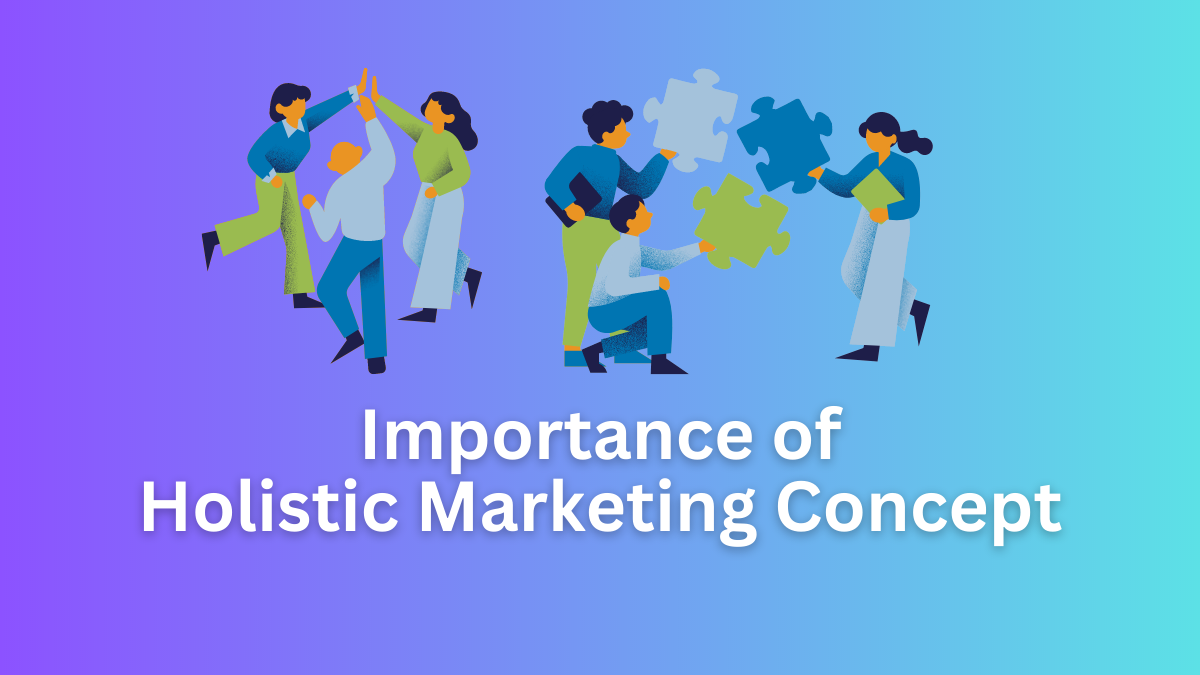Importance of Holistic Marketing Concept
Holistic marketing is the new thinking in the marketing world – it is about working in the wholism approach. It argues that the best way to achieve a company’s goals is through a well-coordinated effort through all the components of the organization.
Holistic marketing works the same as our body works. Let’s explore the 10 key importance of holistic marketing in today’s competitive marketing world.
- Brand Building
- Efficiency
- Customer-Centric
- Long-Term Relationships
- Adaptability
- Employee Morale
- Positive Social Impact
- Comprehensive Decision-Making
- Innovation
- Competitive Advantage
Let’s explore how the holistic marketing concept helps to achieve the above-mentioned 10 importance.
Brand Building
Holistic marketing plays a crucial role in brand building by ensuring a consistent and strong brand identity across all aspects of a business. This consistency helps customers recognize and connect with the brand, building trust and loyalty.
For example, a company can use the same messaging, values, and visual elements in its advertising, customer service, and product design. This unified approach reinforces the brand’s image, making it memorable and distinct in the market.
Related: 8 Pros and 7 Cons of Holistic Marketing Concept
Efficiency
The holistic marketing concept enhances efficiency by integrating all departments and functions within a business. When every part of the organization aligns with a common goal, there is reduced duplication of efforts, smoother communication, and optimized resource allocation.
For instance, a company that integrates its marketing, sales, and production teams can respond more efficiently to market demands, reducing delays and unnecessary costs. This efficient coordination ultimately leads to better resource management, increased productivity, and improved profitability.
Customer-Centric
Holistic marketing places a strong emphasis on understanding and meeting customer needs comprehensively. By adopting a customer-centric approach, businesses can tailor their products, services, and communication to align with customer preferences. This customer-focused strategy ensures that businesses are not just selling products but addressing real customer pain points.
For example, a company that actively gathers feedback conducts market research, and uses data analytics can develop offerings that better match what customers truly desire, leading to higher satisfaction and brand loyalty.
Long-Term Relationships
Building long-term relationships with customers and stakeholders is a key advantage of the holistic marketing concept. By consistently delivering value and understanding the evolving needs of these groups, businesses can establish enduring connections.
Read Also: 8 Pros and 7 Cons of Societal Marketing Concept
For instance, a company that invests in personalized customer experiences, after-sales support, and engagement initiatives can foster strong relationships. These relationships not only lead to repeat business but also to positive word-of-mouth, referrals, and a positive brand reputation.
Adaptability
Holistic marketing is inherently adaptable. It allows businesses to stay responsive to changes in the market, technology, and customer preferences. By considering the broader business ecosystem, companies can identify emerging trends and proactively adjust their strategies.
For example, a company that monitors market shifts listens to customer feedback, and embraces innovation can quickly pivot its offerings to stay ahead of the competition. This adaptability ensures that businesses remain relevant, resilient, and capable of seizing new opportunities while navigating challenges.
Employee Morale
Holistic marketing positively influences employee morale by creating a sense of purpose and unity within the organization. When employees understand that their contributions align with a broader, shared goal, they feel motivated and valued.
For example, a company that fosters an inclusive culture, communicates its mission clearly, and involves employees in decision-making helps boost morale. High employee morale leads to increased job satisfaction, better teamwork, and higher productivity, ultimately driving the organization toward its marketing objectives.
Read Also: 8 Pros and 7 Cons of Selling Concept of Marketing
Positive Social Impact
Holistic marketing promotes responsible business practices that benefit both the company and society. By considering societal values and ethical standards, businesses can avoid harmful practices and actively contribute to the community’s well-being.
For instance, a company that focuses on sustainable sourcing supports local initiatives, and adheres to ethical manufacturing processes creates a positive social impact. This not only improves the company’s reputation but also contributes to a better world, aligning with consumers’ growing demand for socially responsible businesses.
Comprehensive Decision-Making
The holistic marketing concept empowers businesses to make better decisions by considering a wide range of factors. Rather than making isolated choices, companies evaluate the impact on various aspects such as customer satisfaction, employee well-being, financial viability, and long-term sustainability.
For example, a company that incorporates feedback from different departments analyzes market trends and assesses the societal implications of its decisions achieves comprehensive decision-making. This approach minimizes shortsighted choices, reduces risks, and ensures that decisions align with the organization’s overall objectives.
Innovation
Holistic marketing encourages innovation by fostering a collaborative environment and embracing creativity across the organization. When different departments work together, share insights, and explore new ideas, innovation flourishes.
For instance, a company that encourages cross-functional teams, rewards innovative thinking, and allocates resources for research and development cultivates innovation. This innovation-driven approach leads to the development of groundbreaking products, services, and processes, keeping the business ahead of the competition and meeting evolving customer needs.
Competitive Advantage
Holistic marketing provides a competitive advantage by enabling businesses to differentiate themselves in the market. A holistic approach allows companies to stand out by offering a unique value proposition, superior customer experiences, and responsible business practices.
For example, a company that consistently delivers quality products understands its customers deeply and aligns with societal values gains a competitive edge. This advantage not only attracts more customers but also builds brand loyalty, making it challenging for competitors to replicate the holistic experience.
Read Next: Societal Marketing Concept: Definition, History,
Arti Kushmi holds a BBS (Bachelor in Business Studies) degree and shares her business and marketing knowledge through this website. While not writing she will be reading and enjoying the moment.
